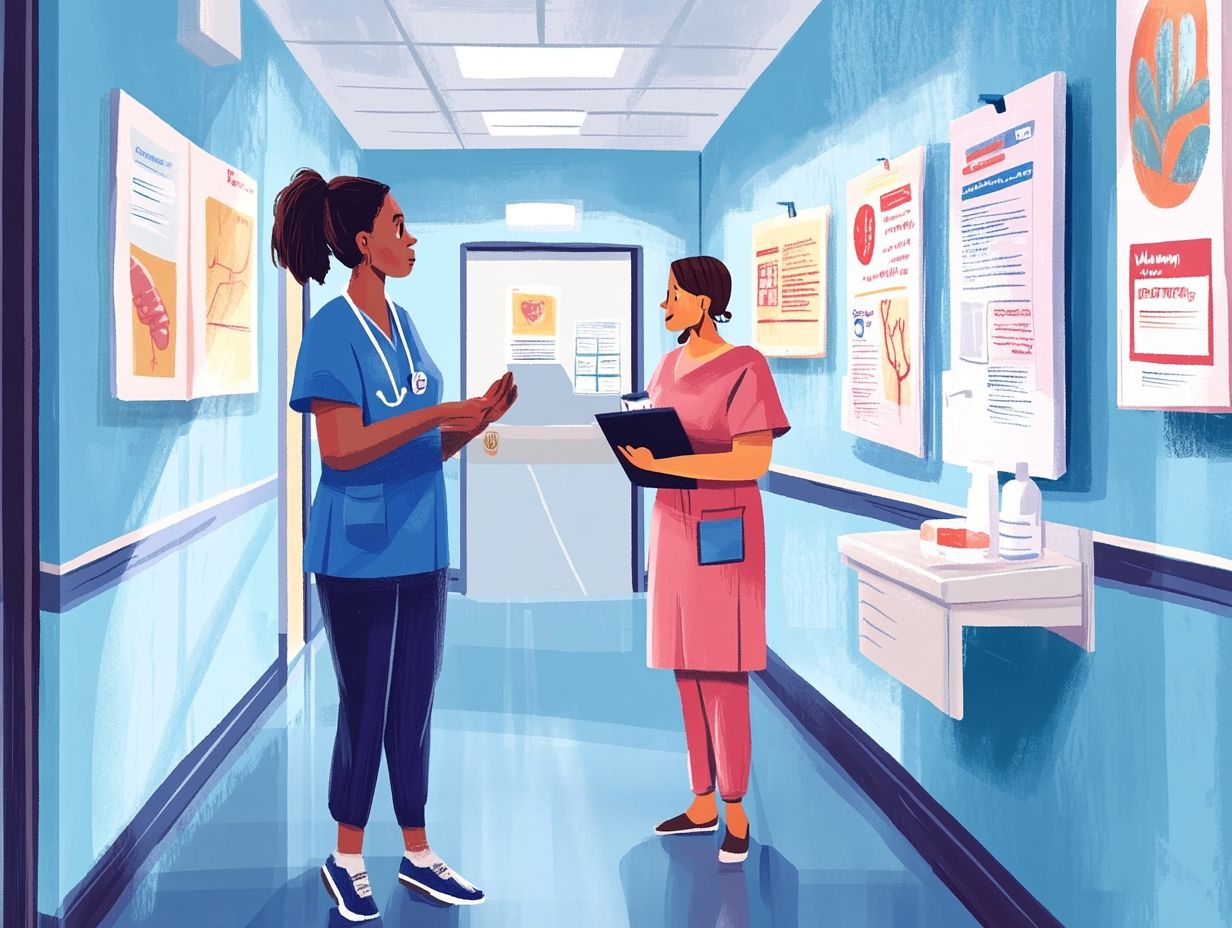Navigating hospital resources for cancer care is crucial for patients seeking comprehensive support throughout their treatment journey. Cancer care encompasses diagnosing, treating, and supporting individuals with cancer through various medical interventions, patient navigation, and support services.
Patients benefit from a wide array of hospital resources, including cancer screening, which is vital for early detection and effective treatment, as well as:
- Oncology departments
- Chemotherapy units
- Radiation therapy facilities
as well as specialized healthcare professionals like oncologists, radiologists, and oncology nurses. Supporting services such as counseling, nutritional guidance, and patient education are integral to a holistic care approach, addressing barriers to care and ensuring quality support.
Understanding the roles of medical professionals and support staff, such as oncologists, patient navigators, and social workers, enhances the patient experience and treatment outcomes. Collaboratively, these teams incorporate evidence-based interventions and develop personalized treatment plans, ensuring medically sound strategies that align with patients’ goals.
Moreover, managing the cost of cancer care by exploring insurance coverage and financial assistance programs alleviates financial burdens, while maintaining mental and emotional well-being through counseling and support groups plays a vital role in fostering resilience and addressing healthcare costs.
Engaging with these resources effectively helps patients and families navigate the complexities of cancer care, ensuring comprehensive support, patient engagement, and improved health outcomes.
Key Takeaways:
Understanding Cancer Care

Cancer care involves diagnosing, treating, and supporting individuals with cancer through medical interventions, patient navigation, and support services.
Cancer care includes treatment options like surgery, chemotherapy, and radiation, as well as emotional and psychological support for patients.
Collaboration among healthcare professionals ensures comprehensive and culturally competent care tailored to each patient’s needs, addressing health disparities.
What is Cancer and How is it Treated?
Cancer is a disease characterized by uncontrolled cell growth that can occur in various parts of the body.
Cancer treatment involves chemotherapy, radiation therapy, and surgery, depending on cancer type and stage.
Chemotherapy uses drugs to destroy cancer cells; radiation therapy directs high-energy waves at tumors; surgery removes cancerous tissues.
Early detection and diagnosis of cancer, including processes like colorectal cancer screening, improve treatment effectiveness and patient outcomes.
Types of Hospital Resources for Cancer Care
Hospital resources for cancer care include:
- oncology departments
- chemotherapy units
- radiation therapy facilities
- surgical teams specializing in cancer treatment
- palliative care services
Resources also encompass access to specialized healthcare professionals like oncologists, radiologists, and oncology nurses, who provide cancer-focused guidance and support.
Support services such as counseling, nutritional guidance, and patient education programs are integral hospital resources for comprehensive cancer care.
Medical Professionals and Support Staff
Medical professionals and support staff in cancer care include:
- Oncologists
- Patient navigators
- Nurses
- Radiologists
- Pharmacists
Oncologists diagnose and treat cancer, while patient navigators guide patients through healthcare processes.
Nurses, radiologists, and pharmacists coordinate treatment and manage side effects.
Social workers and nutritionists focus on emotional support and dietary needs.
This collaborative team enhances patient experience and treatment outcomes by integrating practical information and communication tips to address patient needs.
Treatment Options and Facilities
Cancer treatment options include chemotherapy, radiation therapy, surgery, and clinical trials, available at specialized cancer care facilities.
Cancer care facilities offer advanced technologies, including telephonic services and integrated solutions, and personalized treatment plans to target cancer cells effectively.
Chemotherapy uses drugs to kill cancer cells, while radiation therapy uses high-energy waves. Clinical trials provide access to new therapies under investigation, monitored by healthcare professionals.
Navigating Hospital Resources for Cancer Care

Navigating hospital resources for cancer care involves identifying available services such as oncology specialists, support groups, and financial assistance programs, facilitated by resource navigators and community health workers.
Patients and families should contact the hospital’s cancer care coordinator or patient navigator to access these services and ensure comprehensive support during treatment.
Creating an Effective Treatment Plan
Creating an effective treatment plan involves assessing the patient’s medical history and treatment preferences to develop a personalized approach.
A collaborative effort between healthcare providers and patients ensures the plan is medically sound and aligns with the patient’s goals.
Customized treatment plans improve patient adherence and satisfaction, leading to better health outcomes.
Utilizing Support Services and Resources
Utilizing support services and resources helps cancer patients with financial assistance, caregiver support, and community resources.
These services address barriers like emotional distress, treatment costs, and logistical challenges, providing cancer survivors with community resources and caregiver support.
Counseling services provide mental health support, while financial assistance programs reduce medical expenses.
Community resources, including local support groups, advocacy organizations, and outreach programs, help patients connect and share experiences, fostering community health and patient management.
Managing the Cost of Cancer Care
Managing the cost of cancer care involves understanding insurance coverage, exploring financial assistance programs, and negotiating payment plans with healthcare providers.
Insurance coverage should be reviewed to identify benefits and out-of-pocket costs associated with cancer treatments.
Financial assistance is available through charities, non-profits, health organizations, and government programs that help cover treatment costs, supporting health equity initiatives.
Patients can reduce expenses by discussing payment plans or discounts with healthcare providers.
Insurance Coverage and Financial Assistance
Insurance coverage helps cancer patients reduce healthcare costs by covering treatments, medications, and specialized care.
Financial assistance for cancer patients includes:
- Grants
- Co-pay support
- Loan forgiveness
These are offered by health organizations to help manage out-of-pocket expenses.
Understanding insurance options and seeking financial assistance can alleviate financial burdens during cancer treatment.
Maintaining Mental and Emotional Well-Being

Mental and emotional well-being for cancer patients involves managing stress, accessing counseling, and participating in support groups.
Cancer patients can maintain well-being through meditation, therapy, and community support.
Effective strategies include:
- Mindfulness
- Regular communication with healthcare providers
- Engaging in relaxing activities
Coping with the Emotional Toll of Cancer
Coping with the emotional toll of cancer involves managing stress, anxiety, and emotions like fear and sadness through support and mindfulness practices.
Effective coping includes engaging in psychological support such as counseling and support groups, using techniques like meditation and deep-breathing exercises, and seeking guidance from healthcare providers.
Assessment tools help gauge emotional well-being, allowing tailored support strategies to foster resilience.
Support Groups and Counseling Services
Support groups and counseling services provide emotional support for cancer patients by offering a space to share experiences and express feelings. These resources help patients manage emotions like fear, anxiety, and grief through shared understanding and community connection, using tools like the distress thermometer.
Community health workers facilitate access to these services and provide guidance to improve patient well-being and address support barriers.
Frequently Asked Questions
What resources are available at the hospital for cancer patients, including those from Latino and African populations?
The hospital offers a variety of resources for cancer patients, including support groups, counseling services, and financial assistance programs.
How can I access these hospital resources for cancer care?

You can access these resources by speaking with your doctor or nurse, or by contacting the hospital’s cancer care center directly.
Are these hospital resources free for cancer patients?
Many of the resources offered by the hospital are free for cancer patients, but some may require a small fee or may be covered by insurance.
Can I bring a support person or caregiver with me to appointments and treatments at the hospital?
Yes, you are welcome to bring a support person with you to appointments and treatments at the hospital. They can provide emotional and physical support during your cancer care journey.
Is there transportation assistance or technology support available for cancer patients who need to travel to the hospital for treatments?
Yes, the hospital offers transportation assistance for cancer patients who may have difficulty traveling to and from appointments and treatments. This service is part of our commitment to overcoming barriers to care and ensuring health equity. Speak with your doctor or nurse to learn more about this option and other available resources, such as community health programs and practical information on healthcare costs and financial assistance.
Are there any alternative or complementary therapies offered at the hospital for cancer patients, including those focusing on cancer screening and patient needs?
Yes, the hospital may offer alternative or complementary therapies for cancer patients, such as acupuncture, massage therapy, or nutritional counseling. These therapies are part of our evidence-based interventions and integrated solutions for comprehensive cancer care. Talk to your doctor or nurse to see if these options are available for you, and consider consulting with patient navigators or a social worker for additional support and guidance on treatment options and prevention strategies.





